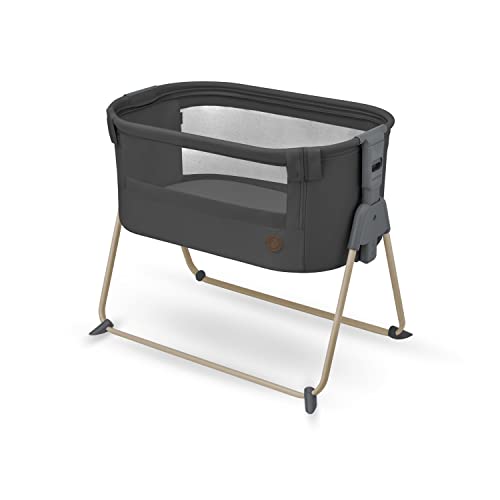Where Will Bedside Cot For Versatile Use Be 1 Year From This Year?
The Versatility of Bedside Cots: A Comprehensive Guide
Bedside cots have actually gotten appeal amongst new parents for their multifunctional design and ease of use. These versatile sleeping options permit caregivers to keep their newborns close while guaranteeing safety and convenience. In this post, we will explore the features, advantages, and various alternatives offered in the market for bedside cots, in addition to offer answers to often asked questions.
What is a Bedside Cot?
A bedside cot, typically referred to as a co-sleeper or sidecar crib, is a small bed created to be connected to the parent's bed. This design permits parents to have their baby within arm's reach while maintaining a different sleeping space. Many bedside cots are adjustable in height, making it easier to align them with the height of the parents' bed.
Key Features of Bedside Cots:
- Attachable Design: Most bedside cots feature a secure attachment mechanism to the moms and dad's bed, guaranteeing safety for the baby.
- Adjustable Height: Many models permit height changes to match the parent's bed mattress.
- Breathable Mesh Walls: To improve exposure and air flow, many styles integrate mesh sides.
- Compact Size: Bedside cots are normally smaller sized than basic cribs, making them ideal for smaller sized spaces or easy mobility.
- Safety Features: Safety is paramount, and lots of bedside cots feature features such as locking mechanisms and sturdy frames.
Advantages of Bedside Cots
Bedside cots not just promote safe co-sleeping practices but likewise bring a myriad of advantages that improve the parent-child bonding experience. Here are some of the most considerable advantages:
1. Close Proximity
Having the baby close allows mothers to react quickly to their infant's requirements, thereby promoting attachment and ensuring a reassuring environment for the child.
2. Easier Nighttime Feeding
Breastfeeding moms find bedside cots profoundly useful as they get rid of the need to rise for nighttime feedings. This can lead to a more peaceful night's sleep for both the moms and dad and the infant.
3. Security and Comfort
Bedside cots supply the security of a separate sleeping space while still producing the intimacy of co-sleeping. This plan is typically advised by pediatricians to decrease the danger of SIDS (Sudden Infant Death Syndrome).
4. Space-Saving
For families living in smaller homes or apartment or condos, bedside cots are a space-efficient solution compared to traditional cribs.
5. Flexibility for Growing Babies
Lots of bedside cots can transition into a standalone crib and even a playpen as the baby grows, ensuring long-term functionality.
Types of Bedside Cots
Before purchasing a bedside cot, it is crucial to understand the various types offered. Below are the most typical ranges:
Standard Bedside Cots: These connect directly to the parents' bed and can be easily moved.
Travel Bedside Cots: Portable models are lightweight and collapsible, making them ideal for travel or trip.
Convertible Cots: These can be transformed into a full-size crib or play area, providing prolonged use.
Swivel Cots: Some designs include a rotating design, allowing parents to quickly reach the baby without having to lift them.
Purchasing Considerations for Bedside Cots
When searching for a bedside cot, it is essential to take certain aspects into account:
Safety Certifications: Always look for safety requirements from trustworthy organizations such as the Consumer Product Safety Commission (CPSC).
Ease of Assembly: Look for models that are easy to set up and protect to the bed.
Product Quality: The materials used in the cot ought to be non-toxic and strong enough to withstand day-to-day use.
Price Range: Depending on features and design, rates can vary significantly. Review your budget and choose a cot that satisfies your requirements.
User Reviews: Consider reading consumer testimonials to gauge the cot's sturdiness and functionality.
A Comparison Table of Popular Bedside Cots
Brand
Type
Price Range
Weight Capacity
Unique Features
Chicco Next2Me
Standard
₤ 200-₤ 300
9-36 pounds
Adjustable height, retractable sides
Baby Delight
Convertible
₤ 150-₤ 250
5-30 pounds
Can transform to a play yard
Joovy Room2
Travel
₤ 100-₤ 150
5-50 pounds
Portable, easy fold design
Cuddle Me
Swivel
₤ 250-₤ 350
5-30 pounds
360-degree swivel function
Frequently Asked Questions
1. Are bedside cots safe for newborns?
Yes, bedside cots are equipped with safety functions that make them a safe sleeping alternative when utilized properly. Always make sure that the attachment to the primary bed is safe and secure.
2. Can I use a bedside cot for co-sleeping with twins?
While most bedside cots are designed for single infants, some models are larger and can accommodate twins. Nevertheless, talk to Going On this page for assistance.
3. For how long can a baby sleep in a bedside cot?
Typically, babies can use a bedside cot up until they reach around 30-35 pounds or can climb out, which is normally around 5-6 months, however it might vary based on the design.
4. How do you clean up a bedside cot?
Most bedside cots feature detachable and washable bed mattress or covers. It's a good idea to describe the manufacturer's care guidelines for more specific cleansing standards.
5. Can I travel with a bedside cot?
Yes, lots of bedside cots are developed to be portable and can fold for travel. Look for travel-friendly models if you expect moving around often.
Bedside cots provide a convenient and safe option for parents who want to keep their newborns close by, integrating the benefits of co-sleeping with the security of a different sleeping space. With numerous styles, functions, and options readily available, it is vital for parents to thoroughly consider their needs and preferences before making a purchase. Investing in a premium bedside cot can help with a smoother nighttime routine and promote a better bond between moms and dad and kid.
